Man shares story of redemption after release from prison

Arthur "Butch" Wilton Davis was 19 in 1977, when he went to prison for murder. In 2020, he emerged into a different world.
"I was a young man that was on drugs and alcohol, had an active addiction," Davis said.
Davis, who is from Asheville, was 15 when he started using drugs, including heroin. He said that he was introduced by someone who told him "it was a way to feel better, to feel good."
Four years later, Davis killed a man, stabbing him to death during an argument. After the man was dead, Davis emptied the man's pockets, taking money he felt the man owed him.
"As soon as it was over and I calmed down, … it registered that I'm in trouble. What I done was wrong," Davis said.
There was a $5,000 reward in place for information leading to Davis' arrest, and people he knew turned him in. Police came to his house and arrested him. Even at 19, he knew he was in trouble. He had chosen to end someone's life, and he was locked in jail.
"I felt remorse right then as soon as I was locked in jail," he said. He pleaded guilty to second-degree murder just over three months later, and he was sentenced to life in prison.
"I wanted to give people closure. I knew that I was wrong," he said "And I didn't want, you know, anybody's family, my family or his family, … continuously going through this."
While Davis' arrest and subsequent murder conviction took place more than 40 years ago, his story is largely familiar. Davis, who now lives in Gaston County, said he is telling his story because he wants to somehow reach young men like him, who are on the brink of making life-altering mistakes.
In recent months, Gaston County has seen a rash of killings involving people under the age of 21. Some who have been charged with first-murder are only 17, so young that their cases started in juvenile court and their names were initially redacted from the public record.
Gaston County Chief Public Defender Stuart Higdon said that defense attorneys are encountering many instances of youths charged with crimes involving guns.
"And, at least from my perspective, it seems to be a little more distressing, the type of crimes we're seeing," he said. "We're seeing a lot of youthful offenders with guns."
While Davis' crime did not involve a gun, it was equally as serious. In prison, other men talked to him about his crime, "how I needed to work toward changing," he said.
For his first 10 years in prison, he didn't expect to leave. He knew parole was a possibility, but it was not a thing obtained easily.
Besides, he said, he felt he was where he needed to be. He felt intense guilt for what he had done, he said.
"Because my mother and my father," a registered nurse and a welder, "did not raise me that way."
Change came slowly for Davis. He stopped using hard drugs in 1986, nine years after he went to prison, and he eventually began attending Alcoholics Anonymous and Narcotics Anonymous meetings.
"One of the sponsors said, 'Butch, you know what the problem is? You haven't forgiven yourself for your crime,'" he said.
Davis became a Christian in 2008. By then, he was in a prison camp in Newton, and to get passes to temporarily leave the prison, he had to go to church.
"I was sitting in church. The next thing I know, I was kneeled down at the altar and was praying to be forgiven," he said.
It felt "like I was on fire," he said. "I felt relief."
Davis decided that he wanted to improve himself. He began working toward his GED, taking vocational classes in prison.
"I started pulling away from the prison lifestyle and started to make my life productive. No matter where I was in prison, I was going to be productive," he said.
By then, he was around 30 years old. He began working toward parole, a lengthy, difficult process that would take him several more decades.
"When you come up for parole, they evaluate where you're at as far as (what level of) custody you're in, what's going on with your life at that time," Davis said. "The only time that you will meet with the Parole Commission in North Carolina is when you're being strongly considered for parole," Davis said.
He was eventually put on a program that he had to follow in order to be released on parole.
He said he was psychologically evaluated nine times before he was eventually granted parole. He had to show the Parole Commission not only that he had changed, but that he had support on the outside.
Support, he said, was the key. He asked men he knew who were released from prison and later returned what brought them back.
"And one of the things that I heard from people was not having a support group, getting back into the same lifestyle, and not having a solid foundation," he said.
For Davis, that support came from several places.
In May 2013, Davis went to work at an industrial manufacturer in Belmont, as part of a prison work-release program. He also began attending an addiction recovery group at Catawba Heights Baptist Church, and one of the men from the group became his sponsor.
He also met a woman at Catawba Heights, Carlene Davis, who he married in 2012.
After working toward it for decades, Davis was released from prison on parole in 2020. By then, he had been incarcerated for 43 years.
"Parole is not just given out. It's not like saying, 'here you go, well, you've been locked up for 20 years and we're gonna let you go.' It's not like that. It's nowhere near like that," he said. "You must show that you have changed and that you're living that life that you say that you've changed to."
Davis, who most recently was held at the prison in Dallas, emerged in 2020 to a world that had changed on more than one level. Technology has drastically evolved since 1977. When Davis went to prison, people were using eight-track players to listen to music. Now, instead, smart phones are ubiquitous. He had never used a cell phone.
"The telephone I was scared to death of," he said.
Now, Davis wants to reach others like him. He hopes to eventually start a program called FINE, Felons In Need of Employment, and he wants to tell youth where he has been because of his choices.
"I want the guys to see that there is a different way. And I want the youth to hear where I have been because of my choices," he said. "And where my choices landed me. And if they choose that lifestyle, … here's what you can expect."

In the meantime, he said, he and his wife plan to live in an RV. Someday, once his parole ends in 2025, he hopes to be able to travel.
For now, he lives in a mobile home with his wife near Lake Wylie and works at the manufacturing facility he started at in 2013. He owns a motorcycle, and he and his wife enjoy riding it. To succeed after prison, he said, "it takes a plan. It takes support. And it takes action, following through on what your plans are."
"There are some good men and women in prison. They just made bad choices."
Reporter Kara Fohner can be reached at 704-869-1850 or at kfohner@gannett.com. Support local journalism by subscribing here.

This article originally appeared on The Gaston Gazette: Gaston County man shares journey from prison to redemption

